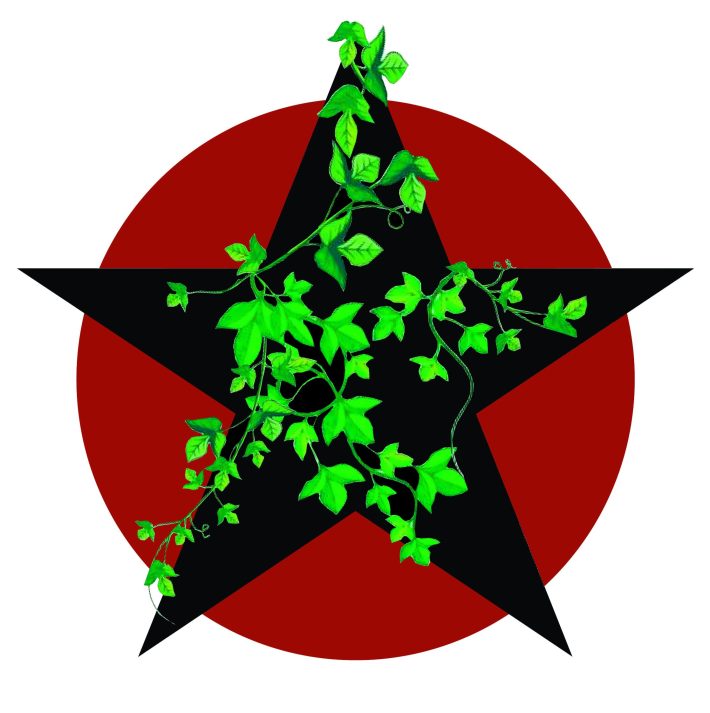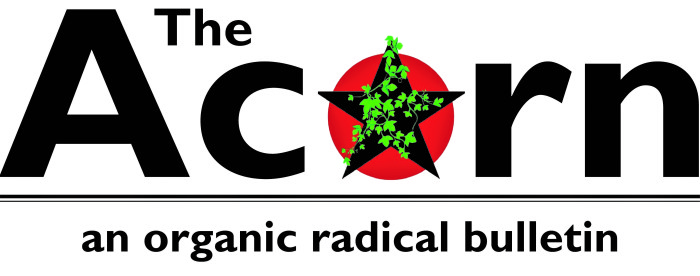Number 94
- Exposed: how the climate racketeers aim to force us into smart gulags
- Electoral fraud: the illusion of democracy
- Getting started on making a difference at the grassroots
- Friedrich Hölderlin: an organic radical inspiration
- Acorninfo
1. Exposed: how the climate racketeers aim to force us into smart gulags

Shocking evidence is emerging from Australia and New Zealand of how the climate scam is being used to impose a techno-totalitarian smart-city future.
The criminocratic global imperialists often use their Commonwealth colonies to try out the most insidious escalations of their tyranny – think of Canada, New Zealand and Australia during Covid.
We can therefore assume that this is going to be the blueprint for the roll-out of their Fourth Industrial Revolution agenda across the world.
The sinister scheme in question, called “Managed Retreat”, has been exposed by independent researcher Kate Mason on her excellent Substack blog aimed at “deconstructing 4IR narratives”.
The idea is that exaggerated “modelling” of the imagined effects of “climate change” is being used to define certain areas as unsuitable for human settlement.
Working hand in hand with the state is the insurance industry – long a central part of the corrupt criminocratic empire – which deems homes in these areas to be “uninsurable”.
Banks are also playing their part (of course!) saying they are unwilling to provide mortgages for these “uninsurable” properties.

In her latest article, Kate refers to a TV report about Kensington Banks, near Melbourne city centre, which has been newly declared a flood zone.
She writes: “Property prices are expected to plummet by 20 percent. I think that’s rather conservative – who is going to buy in a flood zone? Unless it’s a developer who will raze it all to the ground and build a Smart Resilient complex”.
Meanwhile, in New Zealand, residents are up in arms about attempts to impose “retreat” from coastal areas under the pretext of a predicted rise in sea levels.
As this media report shows, they are not buying the scaremongering climate propaganda.
Tim Rees said: “I’ve lived by Paraparaumu Beach since 1965 and the beach is actually getting bigger. For 45 years I’ve dived off Kāpiti Island and the rocks are still at the same height at low tide”.
Added Tania Lees: “The science isn’t settled and there is no consensus. We don’t believe the sea levels are rising significantly and [that] we will all be flooded.”
Central and local government couldn’t fund “a process on this scale”, she said. “So far, the ratepayers have paid in excess of $4 million for the Takutai Kāpiti process.
“We simply can’t afford to spend more. If implemented, managed retreat would be in excess of $1 billion.”

As for the agenda behind all this, Kate writes: “Finding the information on climate change modelling and insurance has joined the dots for me regarding the enormous amount of pack and stack housing developments going ahead in Australia.
“They’re going to need to put us all somewhere when our houses are uninsurable and we have to sell them for a pittance.
“It is clear that this is ‘Resilient’ Smart Cities. Everything hooked up to the internet and data collected, stored and used as modelling to dictate increasingly dystopian government measures of control and enforcement”.
By way of confirmation, she reveals that the Insurance Council of Australia, involved in Managed Retreat, works within the Public Private Partnership model and adheres to the United Nations Sustainable Development Goals, even being a foundation member of the United Nations Principles for Sustainable Insurance.
The UN’s smart gulag agenda was paraded in their 80-page booklet entitled “Centering People in Smart Cities: A playbook for local and regional governments”, as we reported in 2022.
Also in 2022, a body called the Australian Climate Council released a study which estimated that 1 in 25 of all homes and commercial buildings in the country would become effectively uninsurable by 2030 because of “worsening extreme weather events”.
River flooding posed the biggest risk, according to the study, with flash flooding and bushfires identified as the other main hazards contributing to properties becoming “uninsurable”.
As well as calling for “managed relocations”, the report stressed the need for “upscaling public investments in resilience” and to “support communities to ‘build back better’”.
It declared: “Towns, cities and communities must be rebuilt – where appropriate to do so – in a way that takes into account the inevitable future changes in climate and makes them more resilient”.
It comes as little surprise that this report was proudly showcased on the website of the World Economic Forum…

2. Electoral fraud: the illusion of democracy

by Paul Cudenec
With big elections looming up all over the place, I thought this would be a good moment to remind people of what a fraud they are, on many levels.
i. Captured parties.
It has become very obvious to very many people, particularly since Covid, that the main political parties everywhere are all controlled by the criminocracy. No politicians are allowed anywhere near power unless they are signed up to the whole agenda of totalitarian “sustainable development”, public-private “partnership”, pouring money into Ukraine and pretending that Israel is not carrying out mass murder in Gaza. Control of the political parties has been in place for a very long time indeed, not just by means of bribery and blackmail but also through infiltration by the public-funded “intelligence” services set up to serve the criminocrats’ interests. Even the smallest and most insignificant political group is targeted and it is only a matter of time before any new initiative, no matter how genuine, will be taken over. If it cannot be successfully turned in a direction that suits the powers-that-shouldn’t-be, it will be destroyed from the inside by bitter disputes and splits, playing on existing fault lines and personal weaknesses.
ii. Why parties anyway?
A month or two ago, some friends and I secured a meeting with our local deputé (member of parliament), who is in the main left-wing opposition party, La France insoumise, to ask him some questions. High on our list was the threat of the WHO treaty, giving unprecedented control to a global body in the case of a future “pandemic”. Since he hadn’t even heard of the issue, one of our group explained it all to him and then asked him whether he agreed with us, in principle, that this was a worrying prospect. He wouldn’t give a personal opinion, insisting that he was committed to a collective outlook and that, basically, he would have to go and find out what the party line was before he could answer. This raises the question of to what extent an MP belonging to a political party really represents the people who elected him, or whether he in fact represents the party whose line he defends and which is in turn controlled by other interests. What is the purpose of the party system if not to prevent representatives from speaking and voting from their own convictions, or in response to the views of their constituents?

iii. The problem with representation
A deeper problem here is that of representation itself. When a population accepts to be “represented” by a politician they are essentially handing him a blank cheque to act as he (or his party) sees fit. He is under no legal obligation to carry out the promises on which he got elected and, when some new issue arises, is not expected to return to his constituents to seek their opinion. This clearly does not amount to democracy. One of the big demands of the Gilets Jaunes here in France in 2018-19 was for citizens to have the right to call for a referendum on important issues, with the direct voice of the public thus taking precedence over the indirect filter of the controlled “representative”.
iv. The shaping of opinion
There are issues even with this notion of direct democracy, though. One of these is the way that public opinion is itself moulded by mass media that are owned by the same criminocrats who control the political parties and, thus, the elected representatives. Covid showed us how effectively the majority can be conned by constant full-spectrum propaganda. These techniques could equally be used to sway a referendum. At election times, “opinion polls” relayed by corporate media form part of the manipulation, their real aim being not to reflect public opinion, but to shape it. If, for instance, a “problem” party was doing well and clearly had a chance of coming to power, the polls would announce instead that they had virtually no support and that people would do better to vote for one of the lesser-of-two-evils options. No real democracy seems possible without an independent media to properly inform the public.
v. Centralised society
A further barrier to democracy is the centralised nature of our societies – centralised nationally, transnationally (such as Europe) and globally. Power flows from the top downwards, not from the people upwards, as would be the case in an actual democracy. Agendas are imposed, institutionally, and elected representatives on any level can do very little to affect them, even if they wanted to. The prime example of this is the “development” and “economic growth” which is the motor of the criminocracy’s expanding wealth and power. The “need” for this has been written into the structure of our social organisation to the extent that public opposition to some new proposed monstrosity will always come up against a centrally-imposed brick wall. (For more on this, see this article). Real democracy would involve the localisation of decision-making, the end of global corporate imperialism and the restoration to communities everywhere of the right to shape their own destinies.
vi. A rigged game
Given everything I have been describing, do the criminocrats ever need to physically “fix” an election? I don’t know, but I am sure that if they felt the need, and had the ability, they would do so. We should not be so naïve as to imagine that they would simply stand back and watch, with a wistful shrug, if a population anywhere voted in a government that represented a genuine threat to their power and interests. If the worst comes to the worst, there is always the option of assassinating troublesome political leaders. Or of declaring yet another “emergency”, suspending elections and switching to the kind of direct authoritarian rule favoured in Nazi Germany or the USSR. At the end of the day, their “democracy” is merely a device with which to distract and control us and, while it has served their purposes well, they do not consider it indispensable.
3. Getting started on making a difference at the grassroots

There’s no one way of building and running a grassroots community project. Because of factors such as demographics and location, the issues projects have been set up to address will differ from each other so they have to be structured accordingly. What also influences the development and structure of a project is who steps up to the plate to start it off and keep it running.
What’s important with any grassroots project is making sure it genuinely involves as many people in the neighbourhood as possible. This will give it the legitimacy it needs to grow and will also ensure a steady number of committed volunteers as everyone feels they have an equal stake in it.
Before anything happens with getting a project off the ground, it’s vital you talk to people in the neighbourhood. Listen to them, find out what they want and how they think it could come about. Try to get as many people as possible involved. Not everyone is going to be able to commit a massive amount of time to a project but even if they can only offer an hour or so a week, value that contribution. Life is complicated and there are valid reasons why a lot of people can only manage to offer an hour or so a week.
Even though someone can only offer a limited amount of time, if the project is operating in their neighbourhood, they have to be seen as having a stake equal to someone who can contribute more hours. Creating a hierarchy of who can have more say in how a project develops based on the number of hours they can commit to it will alienate people and eventually start to deny it the legitimacy it needs to function. Inclusiveness, collective decision making and accountability are key factors in the success or failure of a successful grassroots project.
In The Directory, there’s a list of all the grassroots community projects across Bath, Bristol and the surrounding settlements that we’re currently aware of. Needless to say, it’s a work in progress that is constantly being added to. Any help in doing this or suggestions as to how we can improve The Directory will be greatly appreciated:) Each of these projects has a different story and background we can all learn from. One of the aims of setting up At the Grassroots is to encourage these groups to talk to each other to exchange experiences, ideas and skills with the hope that what emerges is considerably greater than the sum of its parts.

4. Friedrich Hölderlin: an organic radical inspiration
The latest in our series of profiles from the orgrad website.

“I grew up in the arms of the gods”
Friedrich Hölderlin (1770-1843) was a poet and philosopher who played an important role in the development of German Romanticism.
His work helped fuel organic radical opposition to industrial capitalism in German-speaking Europe before the First World War.
Hanz Kohn recalled: “During the first decade of the 20th century, there was a reawakened interest in Romanticism. Novalis and especially Hölderlin were the most read ‘classics’ in our youth.
“For the new generation, specialised and mechanised science seemed cold, lifeless and sterile. We wanted to reach down to the obscure and primordial sources (Urquellen) of being. Mysticism was the fountain of youth in which religious nostalgia of the age immersed itself”. (1)
In particular, Hölderlin was an important inspiration behind the powerful and poetic anarchism of Gustav Landauer. (2)
Along with Novalis, Friedrich Schegel, August Hülsen and others, Hölderlin forged the holistic absolute idealism which surfaced in Jena in the 1790s and was later developed by Friedrich Schelling and Georg Hegel.
This challenged self-consciousness as the self-evident starting point of philosophy and proposed instead that the first principle was the universe itself. Our thinking and our existence, our experience of subject and object, were all contained within the universal whole and were merely particular aspects of its all-embracing reality.

Frederick Beiser writes: “Hölderlin stresses how both the subjective and objective become what they are only through the other. The objective realizes itself as the subjective because nature reaches its perfection in art and human consciousness, which is its highest degree of organization and development.
“Conversely, the subjective realizes itself as the objective because art attains its perfection in becoming nature, and because human activity realizes its final end only in becoming one again with all of nature”. (3)
From Hölderlin’s deeply organic perspective, beauty was not simply a pleasurable appearance, and still less a symbol of goodness, but “nothing less than the harmonic structure of reality itself”. (4)
Although he was greatly influenced by Baruch Spinoza’s non-dualist conception of the universe, Hölderlin increasingly found it sterile and mechanistic and developed his own more poetic, vitalistic, vision.
As Beiser observes: “If the universe is animate, if it is one vast organism, then it should be more than mere oneness; it should be instead oneness separating itself, for organic development involves differentiation, a process by which an inchoate, indeterminate unity becomes an organized and determinate multiplicity”. (5)

Nature was thus something living, evolving, unknowable and inseparable from the human body and mind, he explains.
“The identity of the self depends on the whole of nature, which it can know but imperfectly. Deep within myself there lie the mysterious energies and powers of nature itself, which I cannot entirely know or control”. (6)
Not only did Hölderlin often express his philosophy through poetry, but this approach was itself, in fact, part of his philosophy.
Writes Beiser: “To establish the primacy of poetry, Hölderlin adopted a bold strategy: he would show how the discursive procedures of philosophy ultimately pre-suppose an intuitive awareness of the whole, which is accessible only to aesthetic sense”. (7)
Here, Hölderlin faced the dilemma of how to express this intuitive awareness while not destroying it by trying to reduce it to mere words. He decided to use the language of myth and religion because “all religion is in its essence poetic”. (8)
Trees were my teachers
Melodious trees
And I learned to love
Among flowers
I grew up in the arms of the gods. (9)
Video link: Friedrich Hölderlin with David Constantine (6 mins)

1. Hanz Kohn, Martin Buber, 1930, pp. 60-65, cit. Michael Löwy, Rédemption et utopie: le judaïsme libertaire en Europe centrale (Paris: Éditions du Sandre, 2009), p. 200.
2. Russell Berman and Tim Luke, Introduction, Gustav Landauer, For Socialism, trans. by David J. Parent (St Louis: Telos Press, 1978), pp. 8-9.
3. Frederick Beiser, German Idealism: The Struggle Against Subjectivism (Cambridge, Massachusetts: Harvard University Press, 2008), p. 400.
4. Beiser, p. 397.
5. Beiser, p. 399.
6. Beiser, p. 358.
7. Beiser, p. 378.
8. Friedrich Hölderlin, Sämtliche Werke. Grosse Stuttgarter Ausgabe, ed. F. Beißner and A. Beck (Stuttgart: Cotta Nachfolger, 1943-1985), IV, p. 281, cit. Beiser, p. 397.
9. Friedrich Hölderlin, ‘Da ich ein Knabe war…’, Friedrich Hölderlin: Selected Poems, trans. by David Constantine (Newcastle: Bloodaxe Books, 1996).
http://users.umiacs.umd.edu/~venu/jck.pdf
6. J.C. Kumarappa, Economy of Permanence (Varanasi: Sarva Seva Sangh Prakashan, 1957), pp. 9-10.

What a coincidence! Labour Party leader Keir Starmer, widely expected to be the UK’s next Prime Minister, is not only a staunch supporter of genocidal Israel, but is also, as revealed by Ben Rubin in this UK Column news report, personally linked to the Rothschilds, who were effectively the founders of the Israeli state.

* * *
What really lies behind Vladimir Putin and his Russian regime? In this interview with Riley Waggaman (Edward Slavsquat), Iurie Roșca (former leader of Moldova’s Christian Democratic People’s Party) describes Putin as a “mediocre person” who is essentially just a front man for oligarchs and the Zionist lobby. And here, former Russian oligarch Mikhail Khodorkovsky names none other than Lord Jacob Rothschild (deceased) as the ultimate beneficial shareholder of Russian interests during privatization.

* * *
We were recently pointed to a fascinating and detailed article by Dean Henderson entitled ‘HSBC: The World’s Dirtiest Bank‘, excerpted from his book, Big Oil & Their Bankers in the Persian Gulf. This reveals: “The HSBC ruling families have intertwining interests with other international mega-banks, the global gold and diamond trade and the Anglo/Dutch half of the Four Horsemen – Royal Dutch/Shell and BP Amoco. Lord Armstrong of Ilminster sits on the boards of Royal Dutch/Shell, N. M. Rothschild & Sons, Rio Tinto Zinc and Inchcape, the holding company that controls PONC. Shell director Sir Peter Orr joins Lord Armstrong on Inchape‘s board. Cathay Pacific Airlines owner Sir John Swire is a director at Shell, while Shell director Sir Peter Baxendell joins Lord Armstrong on the board of the Matheson-founded and Oppenheimer-controlled Rio Tinto. Shell also controls BHP Billiton”. Welcome to the crazily-interconnected world of the global criminocracy!

* * *
“More than one Jewish friend or ally has fallen into the trap of insisting that they must support the syndicate killing them because the syndicate is protecting them against rising anti-Semitism — when, in fact, the syndicate is also engineering the evidence of such. Remember the old WC Fields snake and snake potion joke? The salesman markets his snake potion with the help of the snake he also carries with him”. Astute analysis from Catherine Austin Fitts.

* * *
“Like the proverbial boiling frogs, the government has been gradually acclimating us to the specter of a police state for years now: Militarized police. Riot squads. Camouflage gear. Black uniforms. Armored vehicles. Mass arrests. Pepper spray. Tear gas. Batons. Strip searches. Surveillance cameras. Kevlar vests. Drones. Lethal weapons. Less-than-lethal weapons unleashed with deadly force. Rubber bullets. Water cannons. Stun grenades. Arrests of journalists. Crowd control tactics. Intimidation tactics. Brutality”. ‘Mission Creep: How the Police State Acclimates Us to Being Modern-Day Slaves‘ by John and Nisha Whitehead is talking about the USA, but it could be anywhere.

* * *
In 2024 it is plain that we all effectively live under occupation – by a brutal global entity that cares nothing for our preferences, our values, our ethics or our cultures. Richard K Moore was already pointing to this stark reality 24 years ago, in a superb article entitled ‘Beyond Left & Right: Escaping the Matrix‘. He warned: “The techniques of oppression long common in the empire’s periphery are being imported to the core”.

* * *
“Rather than speculating about which movement trends or underhanded tactics that can be observed in play at any given time might be inspired by FBI disruptors or police provocateurs, I thought it would be interesting to just speculate on what kinds of strategies and tools are the sorts of things a modern team of secret police would want to be using, in the course of their work to divide, disrupt, and misdirect groups or movements that are becoming worrisome to them for one reason or another”. A thought-provoking piece from David Rovics – ‘What Would Cointelpro Do?‘ – and additional commentary from Crow Qu’appelle.

* * *
The dubious connections of two high-profile UK “pro-freedom” campaigners – Toby Young and Laura Dodsworth – are explored in an important two-part article by Rusere Shoniwa on his blog ‘A Plague on Both Houses’. He reveals that they are both founders of a company called British Friends of Israel Limited (that’s its logo, below) and comments: “A Zionist proclaiming to be concerned about ‘freedom’, whether it’s bodily autonomy, free speech or economic freedom, is more dangerous than a fully paid-up Covidian totalitarian since the ‘freedom’-loving Zionist is a wolf in sheep’s clothing”.

* * *
Winter Oak’s Paul Cudenec is one of the speakers lined up for the sixth annual “three days against the techno-sciences” gathering in northern Italy from July 26 to 28, 2024. Silvia Guerini and Costantino Ragusa of organisers Resistenze al Nanomondo will be giving talks, along with Maria Heibel, Stefani Isola, Dario Stefanoni, Leonardo Zocca and Vincent Cheynet, editor of La Décroissance journal in France. The event is being held near Acqui Terme and more information can be found here.

* * *
“There remains nothing, in culture or in nature, which has not been transformed, and polluted, according to the means and interests of modern industry”. Guy Debord

(For many more like this, see the Winter Oak quotes for the day blog)
If you like this bulletin please tell others about it. Subscribe by clicking the “follow” button.
—–
Back Issues
Follow Winter Oak on Twitter at @WinterOakPress



All food for the revolution, which if we are not blown up is for sure on the agenda of the next stage of evolution. Raising of our consciousness is vital for making a start and then fanning out the process for the education of those who have made the choice in the existential becoming of a transcendence from the 3rd to the 4th dimension.
Our energy systems allow us to use our potential for creative imaginative spiritual change knowing that we are eternal universal drivers of our own destiny. The dualistic mechanistic illusion is fine in subconscious behaviours but most of these are self sabotaging destructive moments ending in failures. Our evolutionary changes have to contain a reprogramming of our autopilots so that we become less the victim and more the conductor of our being frequencies – the resonator of life itself.
Robin Ashe-Roy
LikeLike
Very well said Robin. Indeed, each of us has to aim to become “the resonator of life itself”.
LikeLike